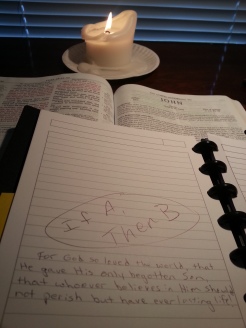Yes, you read the title correctly.
Last time, I wrote about “unconditional” love and grace.
I want to look at the other side of the coin today, mainly to make clear what that article was not insinuating. It was *not* promoting universalism (the idea that no matter what, everyone is okay in the end). To move on with even a chance of leaving that impression would be a dire mistake.
God’s love is unconditional. At no point do I want to reverse or undermine that idea. It is a core truth, and our freedom depends on knowing and believing it.
Let me say it again. His love is unconditional!
But our relationship with Him is not.
Let me explain.
First, Jesus was very clear when He said “I am the Way, the Truth and the Life. No one comes to the Father except through Me” (John 14:6).
Entering into a relationship with God is certainly conditional … conditional on only one thing – the need to trust that Jesus Christ was God and He died for us. But conditional nonetheless.
Second, the quality of our relationship with Him is conditional.
Jesus: “He who has My commandments and keeps them, it is he who loves Me. and he who loves Me will be loved by My Father and I will love him and manifest Myself to him” (John 14:21).
Paul: “The things which you learned and received and heard and saw in me, these do, and the God of peace will be with you” (Philippians 4:9).
So apparently, our actions and attitudes influence not only the existence, but also the closeness of our relationship.
We tend to want to sometimes paint with a broad brush. Either (1) obedience is key, so everything is conditional – God absolutely won’t bless you unless you have everything in order, or (2) God’s love is completely unconditional, so everything is okay, and God will love and automatically rescue you in the end.
The truth is actually somewhere in the middle.
So…from the top, just to make sure we’ve got it:
Nothing is beyond the reach of God’s love and grace. We can never mess up so bad that He won’t rescue us (unconditional).
But we have to ask for that rescue (conditional).
And the more we obey, the more precious is our relationship with Him (conditional).
I’m not saying God will bless or withhold blessings based on our actions. Sometimes it works that way, but not as a rule. We can point to lots of biblical examples where God blessed or didn’t bless based on people’s actions. But I can also point to plenty of examples where blessings fell on the dishonest (scheming Jacob, socially deviant Samson) and curses fell on the obedient (righteous Job, humble Ruth). Jesus Himself said that God “makes His sun rise on the evil and on the good, and sends rain on the just and on the unjust” (Matt 5:45).
What I am saying is we will feel more connected to Him, recognize His activity around us, and hear His voice more clearly as we live the way He desires for us to live.
Allow me one more example: Jesus said “My sheep hear my voice, and I know them, and they follow me” (John 10:27).
A sheep that is standing at the other end of the field and refusing to pay attention doesn’t hear very well. The Shepherd is not deserting him. The Shepherd is not punishing him. But the quality of the relationship is definitely affected.
We have to get away from this image of God as some sadistic bully hovering over us waiting for an opportunity to punish us. We must also not allow ourselves to go to the other extreme of thinking of Him as some washed up pacifist who indiscriminately doles out passes to Heaven.
God is an uncompromisingly just Judge, who loves extravagantly.
He is a pure unconditionally loving Father, who does not abandon His perfect standards.
We can never allow one to cancel out the other. Both coexist, because Jesus reconciled them.
He came to open the door to that one condition that would make the unconditional accessible to all of us.

